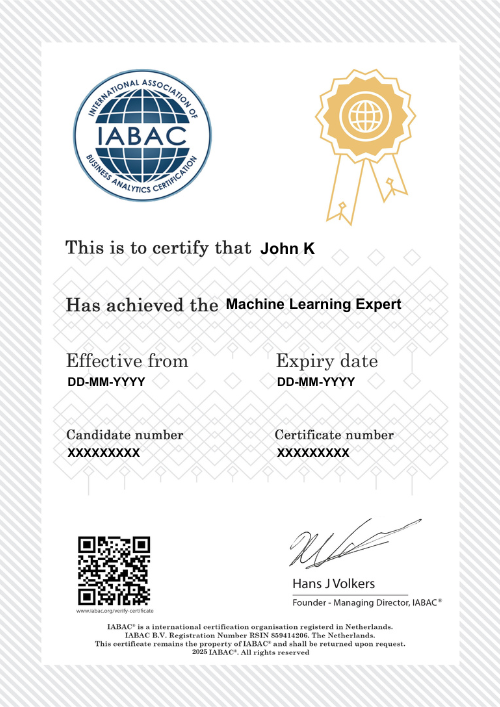Instructor Led Live Online
Self Learning + Live Mentoring
In - Person Classroom Training




The following topics are covered in "Machine Learning"
Foundation:
Machine Learning Introduction: Supervised and Unsupervised Learning
Multiple Linear Regression
Decision Tree:
Naive Bayes:
Support Vector Machines:
Association Rule:
Expert:
Neural Net:
Random Forest:
Recommendation Engine:
Dimension Reduction:
To build a career in machine learning, you need strong skills in programming (Python or R), mathematics (linear algebra, probability, statistics), and data handling. Knowledge of ML algorithms, model evaluation, and problem-solving is equally important, along with curiosity and continuous learning.
Machine learning professionals can work as ML engineers, data scientists, AI researchers, NLP engineers, computer vision specialists, or big data analysts. They are in demand across industries like IT, healthcare, finance, e-commerce, and autonomous systems.
The scope is vast, as industries increasingly rely on automation, predictive analytics, and AI-driven decision-making. With growing adoption in every sector, machine learning will continue to be one of the most in-demand career fields globally.
Popular tools include Scikit-learn, TensorFlow, PyTorch, XGBoost, and Keras. For data handling and visualization, professionals use NumPy, Pandas, Matplotlib, and Seaborn. These frameworks simplify model building, training, and deployment.
Machine learning powers applications like recommendation systems (Netflix, Amazon), fraud detection in banking, disease diagnosis in healthcare, chatbots, autonomous vehicles, and smart city solutions such as traffic prediction.
Python is the most popular due to its rich libraries and ease of use. R is used for statistical analysis, while Java, Julia, and C++ are also applied in specialized ML projects.
Supervised learning uses labeled data to train models, unsupervised learning finds hidden patterns in unlabeled data, and reinforcement learning trains agents through rewards and penalties to make decisions.
Industries like healthcare, finance, retail, e-commerce, IT, manufacturing, transportation, and entertainment are heavily adopting ML for automation, personalization, and efficiency.
Traditional programming follows explicit rules coded by humans, while machine learning allows systems to learn patterns from data and improve performance without being explicitly programmed.
Mathematics and statistics form the backbone of machine learning. Concepts like probability, calculus, and linear algebra help in understanding algorithms and building accurate, reliable models.
Data is the fuel of machine learning. The quality, quantity, and relevance of data directly impact how well a model learns, predicts, and adapts to real-world problems.
AI is the broad field of creating intelligent systems, machine learning is a subset focused on learning from data, and deep learning is a subfield of ML using neural networks to solve complex problems.
ML algorithms are evaluated using metrics such as accuracy, precision, recall, F1-score, and cross-validation. Testing ensures that models generalize well to unseen data.
Big data provides the vast, diverse datasets required for training accurate ML models. It helps algorithms capture complex patterns and make better predictions in real-world scenarios.
Beginners can start by learning Python, brushing up on math basics, and practicing with open-source datasets. Online courses, tutorials, and hands-on projects help in building confidence and skills.
Machine learning enables self-driving cars to recognize objects, predict movement, and make decisions. In smart cities, it supports traffic optimization, energy management, and predictive infrastructure maintenance.
Automation simplifies repetitive tasks like data cleaning, feature selection, and hyperparameter tuning, allowing professionals to focus on strategy, model innovation, and deployment.
Critical thinking, problem-solving, communication, teamwork, and adaptability are essential. These skills help professionals explain technical insights and work effectively with cross-functional teams.
Internships provide practical exposure, real-world projects, and industry mentorship. They help freshers apply theoretical knowledge, build portfolios, and improve employability.
Yes, it’s possible with dedication. Non-IT professionals can transition by learning Python, statistics, and ML basics, then applying skills through courses, projects, and internships.
Upon completing the program, students receive a globally recognized Machine Learning certification accredited by IABAC (International Association of Business Analytics Certifications). This adds strong credibility to your resume and opens career opportunities worldwide.
DataMites is preferred for its expert mentors, industry-driven curriculum, hands-on projects, and excellent placement support. With global certifications and real-time case studies, learners gain both knowledge and practical exposure needed to succeed in the competitive job market.
Yes, the course offers internship opportunities that provide real-world exposure. Internships help bridge the gap between theory and practice, allowing students to work on live projects and gain professional experience.
Yes, DataMites provides flexible EMI payment plans to make the course financially accessible. Learners can pay fees in easy installments, making it convenient for both students and working professionals.
Absolutely! DataMites offers free trial sessions so learners can evaluate the teaching style, curriculum, and training methodology before enrolling.
The course fee generally ranges between INR 30,000 and INR 60,000, depending on the program format, duration, and level of specialization. EMI options and periodic discounts are also available.
Yes, DataMites offers comprehensive placement assistance, including resume building, mock interviews, and job referrals.
DataMites follows a transparent refund policy that varies depending on course terms and the timing of cancellation. Students should review the details carefully at the time of enrollment.
Learners receive comprehensive study materials, recorded video sessions, project resources, and practice datasets. These resources support learning during the course and even after completion.
The training is delivered by experienced industry professionals with strong expertise in AI and ML. They bring real-world insights and mentor students through projects and case studies.
Yes, the course includes live projects and real-world case studies, ensuring learners can apply their knowledge in practical scenarios and become job-ready.
The Machine Learning Course in Nagpur typically runs for around 5 months, including 100+ hours of live online training. Flexible batch options such as weekday and weekend sessions are available.
Yes, students have access to recorded sessions and doubt-clearing support, ensuring they can catch up on missed lessons without disrupting their progress.
Learners build expertise in Python, Machine Learning, Deep Learning, NLP, Computer Vision, and deployment techniques. These in-demand skills prepare them for diverse ML roles across industries.
The Flexi Pass allows learners to attend unlimited batches of a chosen course for one year. This flexibility helps students revise topics, rejoin classes, and learn at their own pace.
The DataMites Placement Assistance Team(PAT) facilitates the aspirants in taking all the necessary steps in starting their career in Data Science. Some of the services provided by PAT are: -
The DataMites Placement Assistance Team(PAT) conducts sessions on career mentoring for the aspirants with a view of helping them realize the purpose they have to serve when they step into the corporate world. The students are guided by industry experts about the various possibilities in the Data Science career, this will help the aspirants to draw a clear picture of the career options available. Also, they will be made knowledgeable about the various obstacles they are likely to face as a fresher in the field, and how they can tackle.
No, PAT does not promise a job, but it helps the aspirants to build the required potential needed in landing a career. The aspirants can capitalize on the acquired skills, in the long run, to a successful career in Data Science.









